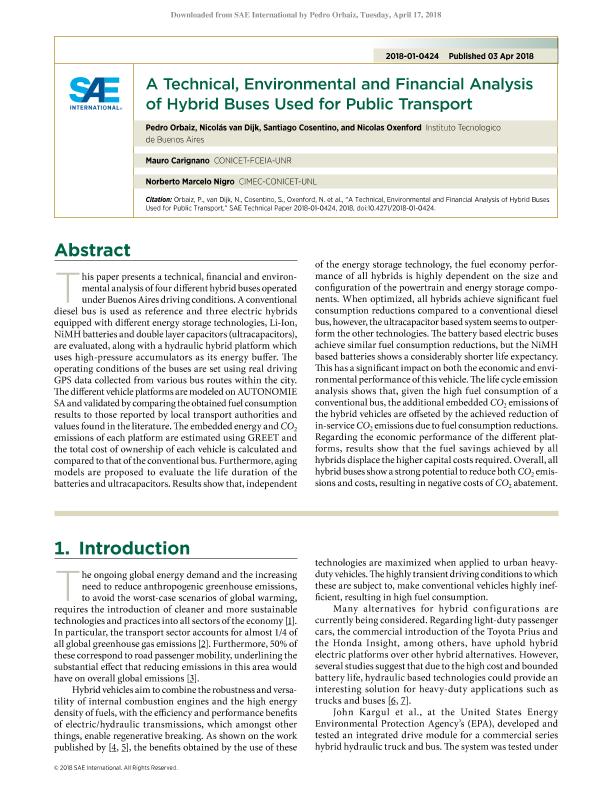Mostrar el registro sencillo del ítem
dc.contributor.author
Orbaiz, Pedro Jose

dc.contributor.author
Van Dijk, Nicolás
dc.contributor.author
Cosentino, Santiago
dc.contributor.author
Oxenford, Nicolas
dc.contributor.author
Carignano, Mauro

dc.contributor.author
Nigro, Norberto Marcelo

dc.date.available
2019-10-17T21:37:10Z
dc.date.issued
2018-04
dc.identifier.citation
Orbaiz, Pedro Jose; Van Dijk, Nicolás; Cosentino, Santiago; Oxenford, Nicolas; Carignano, Mauro; et al.; A Technical, Environmental and Financial Analysis of Hybrid Buses Used for Public Transport; SAE International; Sae Technical Papers; 2018-April; 4-2018
dc.identifier.issn
0148-7191
dc.identifier.uri
http://hdl.handle.net/11336/86254
dc.description.abstract
This paper presents a technical, financial and environmental analysis of four different hybrid buses operated under Buenos Aires driving conditions. A conventional diesel bus is used as reference and three electric hybrids equipped with different energy storage technologies, Li-Ion, NiMH batteries and double layer capacitors (ultracapacitors), are evaluated, along with a hydraulic hybrid platform which uses high-pressure accumulators as its energy buffer. The operating conditions of the buses are set using real driving GPS data collected from various bus routes within the city. The different vehicle platforms are modeled on AUTONOMIE SA and validated by comparing the obtained fuel consumption results to those reported by local transport authorities and values found in the literature. The embedded energy and CO2 emissions of each platform are estimated using GREET and the total cost of ownership of each vehicle is calculated and compared to that of the conventional bus. Furthermore, aging models are proposed to evaluate the life duration of the batteries and ultracapacitors. Results show that, independent of the energy storage technology, the fuel economy performance of all hybrids is highly dependent on the size and configuration of the powertrain and energy storage components. When optimized, all hybrids achieve significant fuel consumption reductions compared to a conventional diesel bus, however, the ultracapacitor based system seems to outperform the other technologies. The battery based electric buses achieve similar fuel consumption reductions, but the NiMH based batteries shows a considerably shorter life expectancy. This has a significant impact on both the economic and environmental performance of this vehicle. The life cycle emission analysis shows that, given the high fuel consumption of a conventional bus, the additional embedded CO2 emissions of the hybrid vehicles are offseted by the achieved reduction of in-service CO2 emissions due to fuel consumption reductions. Regarding the economic performance of the different platforms, results show that the fuel savings achieved by all hybrids displace the higher capital costs required. Overall, all hybrid buses show a strong potential to reduce both CO2 emissions and costs, resulting in negative costs of CO2 abatement.
dc.format
application/pdf
dc.language.iso
eng
dc.publisher
SAE International
dc.rights
info:eu-repo/semantics/openAccess
dc.rights.uri
https://creativecommons.org/licenses/by-nc-sa/2.5/ar/
dc.subject
Hybrid Buses
dc.subject
Powetrain
dc.subject
Life-Cycle Assessment
dc.subject
Public Transport
dc.subject.classification
Ingeniería Mecánica

dc.subject.classification
Ingeniería Mecánica

dc.subject.classification
INGENIERÍAS Y TECNOLOGÍAS

dc.title
A Technical, Environmental and Financial Analysis of Hybrid Buses Used for Public Transport
dc.type
info:eu-repo/semantics/article
dc.type
info:ar-repo/semantics/artículo
dc.type
info:eu-repo/semantics/publishedVersion
dc.date.updated
2019-10-16T19:28:56Z
dc.journal.volume
2018-April
dc.journal.pais
Estados Unidos

dc.description.fil
Fil: Orbaiz, Pedro Jose. Instituto Tecnológico de Buenos Aires; Argentina
dc.description.fil
Fil: Van Dijk, Nicolás. Instituto Tecnológico de Buenos Aires; Argentina
dc.description.fil
Fil: Cosentino, Santiago. Instituto Tecnológico de Buenos Aires; Argentina
dc.description.fil
Fil: Oxenford, Nicolas. Instituto Tecnológico de Buenos Aires; Argentina
dc.description.fil
Fil: Carignano, Mauro. Conicet-fceia-unr; Argentina
dc.description.fil
Fil: Nigro, Norberto Marcelo. Consejo Nacional de Investigaciones Científicas y Técnicas. Centro Científico Tecnológico Conicet - Santa Fe. Centro de Investigaciones en Métodos Computacionales. Universidad Nacional del Litoral. Centro de Investigaciones en Métodos Computacionales; Argentina
dc.journal.title
Sae Technical Papers

dc.relation.alternativeid
info:eu-repo/semantics/altIdentifier/url/https://www.sae.org/publications/technical-papers/content/2018-01-0424/
dc.relation.alternativeid
info:eu-repo/semantics/altIdentifier/doi/http://dx.doi.org/10.4271/2018-01-0424
Archivos asociados
